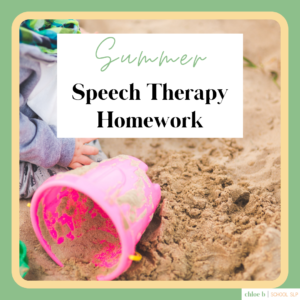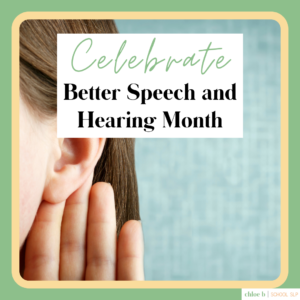The first day of school is such a big deal for our elementary school kids! It can be hard to think of activities for first day of school, especially if you’re a speech language pathologist! We could launch into a normal speech day, but I personally believe there is a better way to set our students up for success for the rest of the year. Here are 5 first day of speech therapy activities!
P.S. There’s a FREEBIE with #4!

#1 Share the Schedule
Just like adults, kids like to know what’s going to happen. It helps ease anxiety and makes students feel more secure. Do you have a schedule in your speech therapy room?
My students love to know what day(s) of the week I’ll be getting them, and they like to know the time and/or what subject they will be pulled from.
They also do well with consistent procedures on the way to my speech room, in my speech room, and on the way back. They know the expectation is to come in, use hand sanitizer, sit down at the table, and begin working. Some students will pick up the schedule easier than others, and they love to remind their peers what to do!
You may also have a schedule of events within each of your sessions. My kids that do the cycles approach know that we start with listening (auditory bombardment) before we get to practicing ourselves!
#2 Set Expectations / Rules
Rules may not be fun, but they’re crucial for creating a safe learning environment. Our students can’t follow our expectations if they aren’t aware of them!
You can make up your own list of expectations – whatever works best for you and your students! Here’s what I use –

#3 Introduce Yourself
Sometimes you have the same students year after year, but most likely you have new kids on your caseload every year! I personally always have new students + new kindergartners for sure! They need to know who you are!
Here are some game ideas:
- Two truths and a lie (Say two things that are true and one thing that is a lie about yourself – everyone tries to guess which one is the lie)
- Never have I ever (Hold up 10 fingers, and put down a finger for each thing you’ve done – try to be last one with fingers still up)
- Toss a beach ball (Write questions on the ball in each color spot and answer based on where your finger lands when you catch it)
The best part is that the first two are free and zero prep! Win!
#4 Get to Know You Activities
My favorite thing to do for this is have the students answer some simple questions (can draw or write the answers based on ability) then verbally present it to the rest of the group.
I can get a quick peek at their speaking skills. Then I can start incorporating some basic wh- questions/comprehension questions about what each child presented. That enables me to get a quick peek at listening skills!
(Don’t worry, I still collect my full baseline data in the next session!)
Here are my first day of speech therapy activities – as a FREEBIE!
#5 Show You Care
In the craziness of the first few days, it can be easy to get caught up in the whirlwind of back-to-back sessions all day. Your students are probably also feeling overwhelmed, especially with all of the changes of being in a new grade with a new teacher.
If you notice a student struggling, reach out to them!
If you see how proud they are of their new school shoes, compliment them!
If you see a need, meet it!
You’re probably doing this already, but it doesn’t help to have a little reminder of how important it is to connect with our kids! It is a HUGE way to build rapport and therefore increase your effectiveness as a therapist!
Bonus – Why Do You Come to Speech?
Not everyone discusses student goals on day #1 due to updating goals after collecting baseline data. Totally understandable. But it may still be a good idea to talk about why that kid comes to see you. Are they working on a specific sound? Language? Fluency? This is a good place to start a conversation and get them thinking!
My advice is to keep it positive + upbeat = promoting a growth mindset!
So there you have it! What else would you add to this list?
– Chloe B | School SLP
Looking for more school related blog posts? Check out 5 Working Memory Strategies to Teach Kids for Improved Academic Success!







One Response